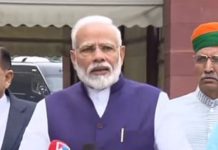
At the Delhi screening of The Lunchbox, in front of the who’s who of the city, lead actor Irrfan Khan announced that the film was being released around the country on 20 September, five months ahead of schedule, so that it has a shot at being selected as India’s official entry for the Oscars. This film, made on a shoestring budget of $1.5 million and directed by first time director Ritesh Batra, is being backed strongly by its US buyer Sony Picture Classics. So strongly, says Khan, that they are guaranteeing a place in the top five if The Lunchbox gets the Oscar nod.
In May, The Lunchbox premiered at the Cannes Film Festival, winning the viewers’ choice award. Overnight, the story of an aging government employee (Khan) and a younger, lonely housewife (Nimrat Kaur), whose epistolary romance begins thanks to a mistake made by Mumbai’s famously faultless dabbawalas, became the talk of the festival.
For the past year or so, alternative voices in Indian cinema have found a steady place in the spotlight. These films are having their cake and eating it — receiving critical acclaim on the international festival circuit and making money at the domestic box office. No longer are Indian films in international festivals patronised as standard Bollywood fare, and no longer are they patronised by distributors back home as being too ‘arty’ for the audience.
Nawazuddin Siddiqui, who even before The Lunchbox was a regular face in offbeat cinema, attributes this success to Gangs of Wasseypur and Miss Lovely. “The international audience was not prepared for good cinema to come out of India,” he says. Nor, it seemed, were Indian distributors and theatres. It took an extraordinary marketing campaign by the team behind Anand Gandhi’s Ship of Theseus, and almost unprecedented box office success for a movie of its size, for theatres to give the film, made on a budget of Rs 2.5 crore, a five-week run across India. Ship of Theseus is this year’s indie darling and a film as different from The Lunchbox as the proverbial chalk and cheese.
But this difference is a good thing, a promising sign for the future of indie cinema in the country. Eschewing the Bollywood ‘formula’— which Anand Gandhi has compared to “junk food, like a Big Mac” and Irrfan Khan calls “fluffy time-pass” — has not resulted in the peddling of some equally hackneyed indie formula. The Lunchbox, Ship of Theseus, Gangs of Wasseypur, Miss Lovely, Udaan… no film resembles the other but they’re all part of the same conversation.
The appeal of The Lunchbox, say its three stars, lies in its unusual love story. It starts with a miracle, says Kaur — a dabbawala who makes the wrong delivery. Then there is the romance of letter-writing, a practice that is mostly obsolete. It is a quiet film, without very much dialogue, expert in its use of silence. That silence makes much more effective the cacophony and bustle of dabbawalas at work, plying their daily routes.
Mumbai’s dabbawalas, though they have existed since 1880, shot to worldwide fame with a 2005 Harvard study which found that they make less than one mistake in every six million deliveries. When accused of making a mistake in the film, a dabbawala quotes the Harvard statistic and a 2003 visit by Prince Charles as proof of their infallibility. They may be a plot device, but director Batra gives these remarkable white-clad men ample screen time, following them on their journeys across the city. “I wanted to make a documentary on them,” he says now. “But when I embedded myself with them, they started telling me personal stories, about the people they meet, such as housewives.”
These stories inspired a script which caught the attention and interest of Guneet Monga, Anurag Kashyap Films CEO and the co-founder of Sikhya Entertainment, and of US-based film producer Lydia Pilcher. Monga brought in Siddiqui, and Pilcher, in turn, got in touch with Irrfan Khan, whom she had worked with on Life of Pi. Batra says loneliness and love are universal. It’s what makes his film appealing anywhere in the world and explains why companies in India, the US, Germany and France have been involved in the production.
The Lunchbox may have a small budget, an offbeat story but is that enough to define it as independent? Filmmaker Anusha Rizvi says that a working definition for a film to be considered independent is that not more than 50 percent of its financing should come from an established studio. But, she asks, does this mean that since, say, the original Star Wars did not have studio backing, would it be classified as independent cinema? Anand Gandhi prefers the term auteur cinema, films that adhere to a director’s vision rather than the dictates of studios, stars and audiences.
Of course, ‘auteur cinema’ in India is not new. Such films have always existed on the periphery of the mainstream, says film scholar Rachel Dwyer, going back to the work of Satyajit Ray, Shyam Benegal and the National Film Development Corporation of India (NFDC) produced films of the 1970s and the ’80s. There is though, Khan points out, no easy line to be drawn from the ‘parallel cinema’ then and indie cinema now. Those films, he says, were sponsored by government largesse. They had no responsibility to turn a profit.
That lack of a commercial imperative meant that avant-garde films, like Kamal Swaroop’s Om Dar-Ba-Dar (1988), went straight from international festivals to cult classic status without ever being screened in an Indian theatre. In a recent interview with the Indian Express, Swaroop recalled how people thought his film was “mad”, that it should never have been made. It is only now, a quarter of a century later, that the NFDC will release a digitally restored print. Distributors in India have always been notoriously skittish about the films they believe are commercially unviable, unwilling to gamble on a film they think might not sell.
It’s an unfriendly, unforgiving climate that has made the current crop of independent filmmakers think harder and smarter about how to market their films. The Lunchbox is being presented to audiences by Karan Johar, a figure who is almost the definition of mainstream and big budget. Similarly, Ship of Theseus, was presented by Kiran Rao. Its marketing team also ran a smart publicity campaign on social media, asking people to vote for the movie to come to their city, which created the sort of ‘word of mouth’ buzz that kept Ship of Theseus in theatres much longer than its makers dared to hope. Peepli Live (2010) was backed by Aamir Khan, while Dibaker Banerjee is being backed by Yash Raj Films. Anurag Kashyap has a reputation for lending his weight and industry cachet to debut films such as last year’s Peddlers, directed by the unknown Vasan Bala.
This companionship between mainstream powerhouses and more experimental filmmakers — many of them first-timers — has proved an effective counter to the wariness of distributors and theatre owners. “A film going to a festival doesn’t automatically mean it’s art house, inaccessible” explains Monga. There is an acceptance among young filmmakers that “cinema is a commercial art”, as Khan puts it. “Distributors have a job to do. The onus is also on us to make films that do business,” says Batra. Business does not only mean becoming part of the 100-crore club. It also means low-budget films like The Lunchbox that have the savvy to make profits and find a place alongside behemoths like Chennai Express.
Not that it’s easy. Or that distributors are willing to bet on every small budget film. Tasher Desh, veteran filmmaker Q’s latest offering, a trippy adaptation of Rabindranath Tagore’s famous play, is still waiting for a nation-wide release date. The Kashyap-backed Peddlers was also not picked up despite the obligatory successful screening at Cannes. Giving space to films that are not tried and tested star vehicles still requires courage from distributors. But at least the definition of commercially viable cinema is broadening, however slowly, to include movies that are layered and intelligent.
“Of course, commercial films have had good content alongside the song and dance,” says Khan. “Guide is about freedom of the spirit, of the body, and from conventional relationships.” The Lunchbox may not have songs or dancing but like Guide it does offer romance and friendship, familiar tropes with any audience. Let’s hope that’s a version of the future: cinema, commercial or independent, that a wide variety of people pay to watch without having to leave their brains at the door.
INTERVIEW
‘I have a fondness for love stories’
The talk of Cannes 2013, ‘The Lunchbox’, releases in India on 20 September. Lead actor and producer Irrfan Khan talks to Aradhna Wal about the universal appeal of romance, his fondness for ‘Guide’ and the lost art of storytelling in today’s cinema

How did you come to be part of The Lunchbox?
The American film producer Lydia Pilcher, who knew me from Life of Pi, sent me the script. I liked it, because of the emotions in it. I have a fondness for love stories, and I identify with the emotion. I saw Ritesh Batra’s short films, and they were fantastic. He is basically trying to capture the actor. However, at some point there were budget issues with The Lunchbox. The film was not able to afford me. Also, I wanted to be a producer; it helps me keep control over the stories, not let them be changed to something else. So I came on board as a producer for The Lunchbox.
Can you tell us more about pushing The Lunchbox for the Oscars?
At Cannes 2013, we got an amazing reaction. We sold the movie overnight. The biggest market is the American market, and Sony Pictures Classics picked us up. They assured us of their backing in the Oscars. They said that they would ensure that it at least got nominated in the top five. This is a unique story. And the Oscars are a great opportunity. If you don’t choose the right film for the Oscars, then it is an opportunity lost. We have confidence that this is the right film.
What was it like working with debutant director Ritesh Batra?
I like Ritesh Batra’s simplicity and his collaborative effort. He is very open to contributions, to what I had to say. The team he arranged was wonderful. He is a unique man who found a universal way of telling a story. Today, we have lost this craft of telling multi-layered stories. We watch single-layered cinema. We have narrowed our definition of what is commercial. We have lost diversity. Earlier there was content along with song and dance in films. There was Bimal Roy, there was Guru Dutt, there was Pakeezah. There was Guide, a story about the freedom of spirit, of body, freedom from conventional relationships. It’s a film that never dates and even the lyrics of its songs were fantastic. Now commercial cinema are fluffy timepass.
Why do you think The Lunchbox performed so well at Cannes this year?
The appeal lies in the feeling of romance, the simplicity of the storytelling. The silences in the film are far more powerful, which is something very difficult to achieve. Also, the silences work without any emphasis on them.
How do you see the past few years of Indian cinema, in terms of non-mainstream films?
I think the signs of good, creative non-mainstream cinema started emerging five years back. They have really manifested themselves in the past year. The audience is watching good cinema. They are becoming mature and demanding good stories. They want to see engaging cinema. But we can’t just call it independent cinema or compare it to the parallel cinema of the ’70s and the ’80s. These current movies are also commercial, they do make money. That cinema was patronised by the government, there was no responsibility for profit. That isn’t possible today. You have to engage the audience. All these new directors – Shoojit Sircar, Dibakar Banerjee, Tigmanshu Dhulia – come with that point of view in mind. They understand that cinema is a commercial art.
Do you think that going for international festivals gives these films a legitimacy that helps them get released in India?
That is a way out for these films that have no marketing budget. It is a route many take. But it’s not always helpful. Films have to have their own merit. Even if they do well outside they might not become popular in India. In the name of art, some people might get indulgent. Some directors will try to tell the audience they are intelligent. Messages in a movie have to be brought in carefully, films can’t be didactic. We haven’t cracked that style of storytelling where we can talk about bigger themes and still engage the audience. That’s something international directors can do. Even a James Bond film, or these superhero franchise films such as Superman or Spiderman, they can pick up larger themes and still make entertaining movies around them.
aradhna@tehelka.com













